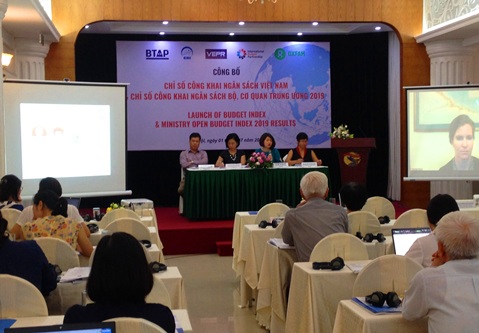 Society
Society


|
| The launch of OBI and MOBI was organised in Hà Nội by the Centre for Development and Integration, the Budget Transparency, Accountability and Participation (BTAP) Alliance and VEPR. — thoibaotaichinhvietnam.vn |
HÀ NỘI — Việt Nam’s Government and Ministry of Finance has made efforts to realise its commitments on public budget accountability and gained increased confidence from people and development partners regarding budget management, director of Centre for Development and Integration (CID) Ngô Minh Hương has said.
The International Budget Partnership (IBP) chose CID to conduct the open budget survey (OBS) 2019 in Việt Nam.
The OBS is the world’s only independent and comparative assessment of the three pillars of public budget accountability – transparency, oversight, and public participation – and been conducted by the IBP biannually since 2006 to assess the public's access to information on how the central government raises and spends public resources.
According to the OBS 2019, Việt Nam ranked 77th out of 117 countries around the world, up 14 places against the previous survey in 2017.
Việt Nam’s budget transparency scored 38 out of 100, the highest score the country recorded since 2010, an increase of 23 points compared to 2017. The average score globally was 45.
Việt Nam scored 11 out of 100 for public participation and 74 out of 100 for budget oversight, up four points and two points, respectively, from 2017.
Việt Nam increased the availability of budget information by publishing the Executive’s Budget Proposal, the Citizens Budget, and the Audit Report online and increasing information provided in the In-Year Reports.
At the launching of Việt Nam’s OBI 2019 on Wednesday, Hương said such improvements showed efforts made by the Government and the Finance Ministry to publicise information about budget management and spending so people can discuss and make recommendations for greater transparency.
“Budget accountability is a tool to gain people’s confidence to the Government,” she said.
“Publicising the State’s budget for policies/programmes would help to implement the policies/programmes better,” she said, adding that improved budget accountability also helps the country gain trust from its partners.
Đinh Thị Mai Anh, head of State Budget Management Department under the Finance Ministry, said Việt Nam’s improved OBI was thanks to changes in the State’s Budget Law 2015 which took effect in 2017.
Under the law, the scale, subjects, content and forms to publicise are expanded, especially statistics and reports on the estimated State budget which the Government submits to the National Assembly are also publicised.
The official also said the ministry provided budget information on its website and people can ask questions and get answers there.
She said that the ministry plans to take measures to improve budget accountability.
For examples, relevant regulations would be reviewed and changed if needed to make Việt Nam’s regulations approach international norms, such as publicising the State’s funds besides the State budget, details of three-year State budget spending plans and outlooks of the yearly State budget.
Information technology will be used to help people access State budget information more conveniently.
The ministry will also tighten supervision of how ministries, agencies and localities publicise their budgets.
Besides the OBI, Việt Nam scored 21.2 points in the Ministry Open Budget Index (MOBI) last year, which reveals the budget transparency of ministries and central agencies, up 10.2 points compared to 2018.
Of the 44 surveyed ministries and agencies, the State Bank of Vietnam ranked first with 73.17 points, followed by Vietnam Television with 49.56 points.
Twenty-four ministries and agencies put at least one out of the six documents they must show to the public online, while 18 announced their budget estimates in 2020 to the public and 17 showed their budget balance in 2018.
At the same time, eight out of 44 ministries and agencies reported the implementation of budget plans for the first quarter of 2019, while 10 made public reports on the implementation of budget estimates in the first half of 2019, seven announced such documents for the first nine months of 2019, and eight published reports for the entire 2019.
Nguyễn Đức Thành, Chief Advisor of the Vietnam Institute for Economic and Policy Research (VEPR), said the results of the two MOBI surveys in 2018 and 2019 reveal a higher level of commitment by ministries and central agencies in implementing the 2015 Budget Law. He added that compared to localities, ministries and central agencies showed less transparency. — VNS




